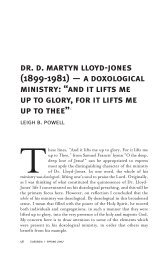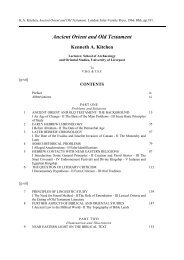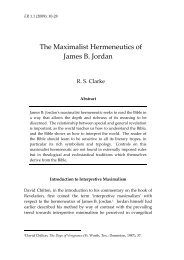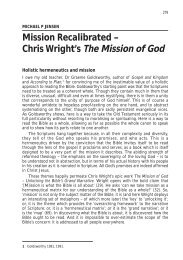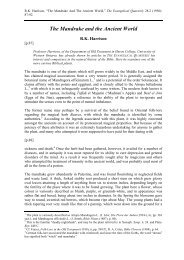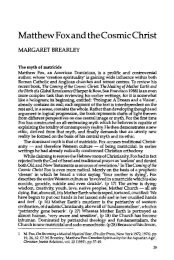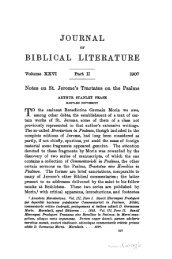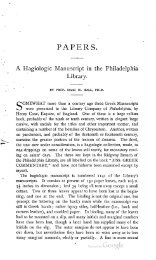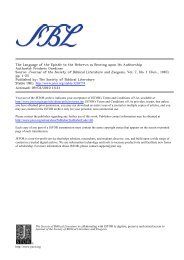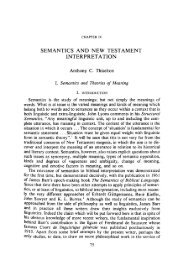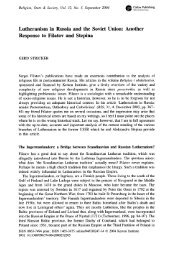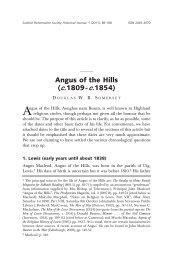'' Imitation of Christ as a Christian Lifestyle-Disembodied Fiction or ...
'' Imitation of Christ as a Christian Lifestyle-Disembodied Fiction or ...
'' Imitation of Christ as a Christian Lifestyle-Disembodied Fiction or ...
You also want an ePaper? Increase the reach of your titles
YUMPU automatically turns print PDFs into web optimized ePapers that Google loves.
through his seei!l~ the imita(io Chris# ~san imitation b£ the. hidden<br />
life o~ Jesu~ at Nazareth. The evdlutionrOf De ·Foucauld's thought<br />
on. thts subject w<strong>as</strong> equally comp~ex and lengthy, but. the essential<br />
pOintS are aS fo,U~WS: he ?egan With the <strong>as</strong>sumption that the three<br />
st~g~s <strong>of</strong> Jesus l~f~ (the htdden Y.ea~s, the temptations and the public<br />
mmts~ry) ha~ legttm~~ted thre~, d~stlnct and mutu~lly ~xclusive types<br />
<strong>of</strong> rehgtous life (the Nazareth life <strong>of</strong> contemplation m cont ct with<br />
one's immediate neighbours, the strictly contemplative life <strong>of</strong> the<br />
desert, and the life <strong>of</strong> priests and apostles, respectively), and that<br />
God had called him to the first <strong>of</strong> these.<br />
Later on, he realised two thing.>. The first w<strong>as</strong> that these three<br />
lives did have certain things in common, such <strong>as</strong> poverty, ch<strong>as</strong>tity,<br />
obedience, contemplation, and practice <strong>of</strong> the inward virtues, chief <strong>of</strong><br />
which were spiritual poverty and humility, and that just <strong>as</strong> Jesus<br />
moved from one to the other, so God might call De Foucauld to do<br />
the same. The second thing he realised w<strong>as</strong> that in any c<strong>as</strong>e, Jesus'<br />
life w<strong>as</strong> a unity maintained by his unwavering will to love, to serve<br />
and to save. This motivation w<strong>as</strong> m<strong>or</strong>e imp<strong>or</strong>tant than the outward<br />
f<strong>or</strong>m <strong>of</strong> his life, and none <strong>of</strong> its three stages made any sense unless<br />
-seen in terms <strong>of</strong> redemption and the cross. Consequently, whilst<br />
De Foucauld felt he w<strong>as</strong> called to imitate the outward <strong>as</strong>pects -<strong>of</strong><br />
Jesus' life <strong>as</strong> well <strong>as</strong> the inner, he came to see that the -latter haCi<br />
pri<strong>or</strong>ity, and the whole w<strong>as</strong> to be seen in a context <strong>of</strong> love and concern<br />
f<strong>or</strong> the salvation <strong>of</strong> man.<br />
•<br />
Thus the "Nazareth" life did not have to be lived either in Nazareth<br />
{<strong>as</strong> De Foucauld believed while he w<strong>as</strong> in the Holy Land, 1897-1900),<br />
<strong>or</strong> <strong>as</strong> a contemplative life apart from men (<strong>as</strong> he believed until much<br />
later on, up to 1904, near the end <strong>of</strong> the first stage ,<strong>of</strong> his life in the<br />
Sahara). So, whilst the "Nazareth" ideal always ~nshrined two<br />
<strong>as</strong>pects <strong>of</strong> De Foucauld's life, contemplation and eucharistic devotion<br />
(ad<strong>or</strong>ation <strong>of</strong> the blessed sacrament being seen <strong>as</strong> analogous to w<strong>or</strong>shipping<br />
with the Holy Family), it did not remain a permanent justi-<br />
1ication <strong>of</strong> his wish f<strong>or</strong> enclosure. He came to realise that if he<br />
modelled his contemplative life on tqe life <strong>of</strong> Jesus at Nazareth, it<br />
would involve m<strong>or</strong>e than occ<strong>as</strong>ional <strong>or</strong> c<strong>as</strong>ual contact with his neighbours.<br />
Not only should they be allowed to come to him,)but in the<br />
name <strong>of</strong> love and in imitation <strong>of</strong> his M<strong>as</strong>ter, he should make positive<br />
~ff<strong>or</strong>ts to go out to see them.<br />
Facing Practical Realities: Beni-Abbes (1901-1905)<br />
So, the monk who had wished to spend the rest <strong>of</strong> his life in a cave<br />
when he w<strong>as</strong> converted, who had then joined the Trappists <strong>as</strong> much<br />
f<strong>or</strong> the security <strong>of</strong> mon<strong>as</strong>tery walls <strong>as</strong> f<strong>or</strong> their strictness and poverty,<br />
who later lived in a garden shed in the enclosure <strong>of</strong> the Po<strong>or</strong> Clares<br />
.at Nazareth, and who on returning to N<strong>or</strong>th Africa had deliberately<br />
established his.dwelling in a little pocket <strong>of</strong> ground near but out <strong>of</strong><br />
.sight <strong>of</strong> the ~rench garrison he w<strong>as</strong> ~i~terin_g to, found he had to<br />
99




